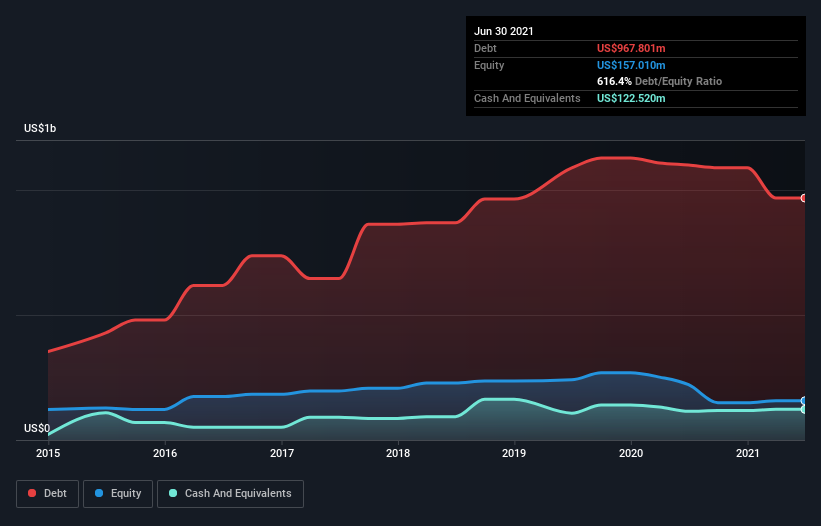Legendary fund manager Li Lu (who Charlie Munger backed) once said, 'The biggest investment risk is not the volatility of prices, but whether you will suffer a permanent loss of capital.' So it might be obvious that you need to consider debt, when you think about how risky any given stock is, because too much debt can sink a company. We note that Avation PLC (LON:AVAP) does have debt on its balance sheet. But the more important question is: how much risk is that debt creating?
When Is Debt A Problem?
Debt is a tool to help businesses grow, but if a business is incapable of paying off its lenders, then it exists at their mercy. Part and parcel of capitalism is the process of 'creative destruction' where failed businesses are mercilessly liquidated by their bankers. However, a more common (but still painful) scenario is that it has to raise new equity capital at a low price, thus permanently diluting shareholders. Having said that, the most common situation is where a company manages its debt reasonably well - and to its own advantage. The first thing to do when considering how much debt a business uses is to look at its cash and debt together.
View our latest analysis for Avation
What Is Avation's Net Debt?
You can click the graphic below for the historical numbers, but it shows that Avation had US$967.8m of debt in June 2021, down from US$1.10b, one year before. However, it also had US$122.5m in cash, and so its net debt is US$845.3m.

A Look At Avation's Liabilities
The latest balance sheet data shows that Avation had liabilities of US$477.9m due within a year, and liabilities of US$648.1m falling due after that. Offsetting this, it had US$122.5m in cash and US$38.8m in receivables that were due within 12 months. So its liabilities total US$964.7m more than the combination of its cash and short-term receivables.
This deficit casts a shadow over the US$90.3m company, like a colossus towering over mere mortals. So we'd watch its balance sheet closely, without a doubt. After all, Avation would likely require a major re-capitalisation if it had to pay its creditors today.
We measure a company's debt load relative to its earnings power by looking at its net debt divided by its earnings before interest, tax, depreciation, and amortization (EBITDA) and by calculating how easily its earnings before interest and tax (EBIT) cover its interest expense (interest cover). Thus we consider debt relative to earnings both with and without depreciation and amortization expenses.
Weak interest cover of 0.56 times and a disturbingly high net debt to EBITDA ratio of 10.7 hit our confidence in Avation like a one-two punch to the gut. The debt burden here is substantial. Even worse, Avation saw its EBIT tank 56% over the last 12 months. If earnings keep going like that over the long term, it has a snowball's chance in hell of paying off that debt. When analysing debt levels, the balance sheet is the obvious place to start. But ultimately the future profitability of the business will decide if Avation can strengthen its balance sheet over time. So if you want to see what the professionals think, you might find this free report on analyst profit forecasts to be interesting.
But our final consideration is also important, because a company cannot pay debt with paper profits; it needs cold hard cash. So the logical step is to look at the proportion of that EBIT that is matched by actual free cash flow. Over the last three years, Avation saw substantial negative free cash flow, in total. While that may be a result of expenditure for growth, it does make the debt far more risky.
Our View
To be frank both Avation's EBIT growth rate and its track record of staying on top of its total liabilities make us rather uncomfortable with its debt levels. And furthermore, its interest cover also fails to instill confidence. It looks to us like Avation carries a significant balance sheet burden. If you play with fire you risk getting burnt, so we'd probably give this stock a wide berth. When analysing debt levels, the balance sheet is the obvious place to start. But ultimately, every company can contain risks that exist outside of the balance sheet. Be aware that Avation is showing 3 warning signs in our investment analysis , and 1 of those is potentially serious...
If you're interested in investing in businesses that can grow profits without the burden of debt, then check out this free list of growing businesses that have net cash on the balance sheet.
New: Manage All Your Stock Portfolios in One Place
We've created the ultimate portfolio companion for stock investors, and it's free.
• Connect an unlimited number of Portfolios and see your total in one currency
• Be alerted to new Warning Signs or Risks via email or mobile
• Track the Fair Value of your stocks
This article by Simply Wall St is general in nature. We provide commentary based on historical data and analyst forecasts only using an unbiased methodology and our articles are not intended to be financial advice. It does not constitute a recommendation to buy or sell any stock, and does not take account of your objectives, or your financial situation. We aim to bring you long-term focused analysis driven by fundamental data. Note that our analysis may not factor in the latest price-sensitive company announcements or qualitative material. Simply Wall St has no position in any stocks mentioned.
Have feedback on this article? Concerned about the content? Get in touch with us directly. Alternatively, email editorial-team (at) simplywallst.com.
About LSE:AVAP
Avation
Avation PLC, together with its subsidiaries, leases commercial passenger aircraft to airlines in Europe and the Asia-Pacific.
Fair value with imperfect balance sheet.
Market Insights
Community Narratives




